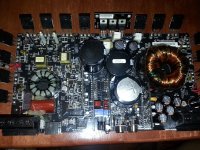Hello i am new to this forum- i hope i am posting in the correct section- i have a p1000-1bd amp that worked GREAT- all of a sudden it conked out and my in line fuse popped- i replaced it and it basically instantly popped again- i opened the amp and one of the LARGE SIZE caps fell out- apparently the solder broke free - i noticed one of teh other 2 large caps had a slight dome to it but i simply resoldered the cap back in and tried it out- this time the fuse popped again- so i removed teh in line fuse and connected the amp direct to battery and it hummed for a couple seconds and then boom.. the cap that was domed originally popped open - absolutely nothing else on the amp seems to be fried or damaged- i am considering replacing all the large size caps with new ones since i assume they are the problem- does that seem likely?> can bad caps cause the amp to blow in line fuses? i am new to this and looking for guidance- thanks in advance!
First of all, NEVER replace a fuse (especially not more than once), without tracing down the reason it popped in the first place -you're just risking further damage.
Second, bad caps can (and do) mess up the feedback signal going to the PWM controller chip, which can in some cases lead to too much input current being drawn, or toasting / shorting the switching devices.
What brand & series are those fat caps, by the way?
Do you at least have a multimeter of some sort, and/or any kind of test equipment?
Second, bad caps can (and do) mess up the feedback signal going to the PWM controller chip, which can in some cases lead to too much input current being drawn, or toasting / shorting the switching devices.
What brand & series are those fat caps, by the way?
Do you at least have a multimeter of some sort, and/or any kind of test equipment?
hello- thanks for your reply- the caps are LELON 3900UF 100V 85Degree Celcius rating- yes i have access to a multimiter
Lelon are usually a liability.
What you could start with is measure the resistance across the input (between after the fuse, and ground), and then maybe between the drain and source pins, on each FET in the power supply section.
What you could start with is measure the resistance across the input (between after the fuse, and ground), and then maybe between the drain and source pins, on each FET in the power supply section.
- Status
- Not open for further replies.
- Home
- Amplifiers
- Class D
- Fosgate p1000-1bd bad capacitors?
